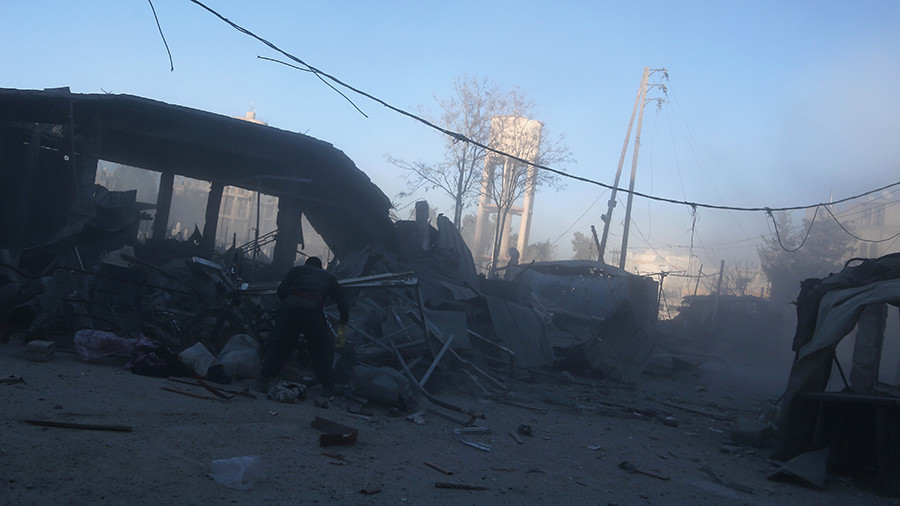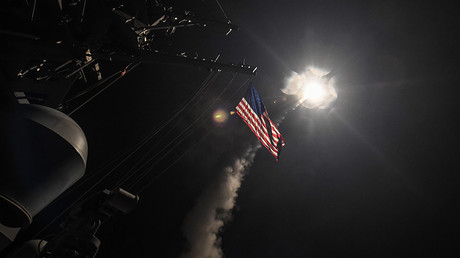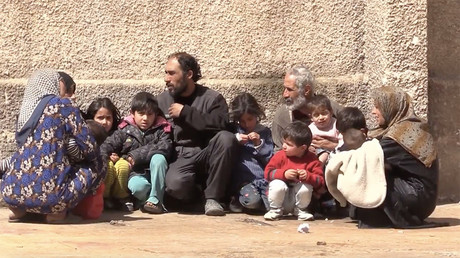Al-Nusra terrorists used chlorine chemicals in Eastern Ghouta – Russian envoy to UN

Russia’s envoy to the UN Vassily Nebenzia has accused militant groups in Eastern Ghouta of using chlorine gas, while stressing that the Syrian government has every right to eradicate the “terrorism hotbed” near its capital.
Nebenzia has defended Syria’s government and the ongoing anti-terrorism operation in Eastern Ghouta, asserting that it has “every right to try and remove the threat to the safety of its citizens.”
“According to information at our disposal, on March 5, Al-Nusra militants used chorine substance in Eastern Ghouta, which injured 30 civilians. All this is done to prepare the grounds for unilateral military actions against sovereign Syria,” Nebenzia stated. “The suburbs of Damascus cannot remain a hotbed of terrorism. And it is being used for continued attempts by terrorists to undermine the cessation of hostilities.”
The ongoing operation in the Damascus suburbs does not violate resolution 2401, which allows the continuation of the battle against terrorists, the diplomat stressed. The terrorists, unlike Moscow and Damascus, do, in fact, frequently attack hospitals and other civilian facilities, and the attacks are well-documented, he added.
“Since the resolution was passed, more than 100 people died from this and a considerably higher number were wounded. More than one hospital...was shelled,” Nebenzia said. “These were true hospitals, genuine hospitals, not headquarters of fighters which they very frequently claim to be hospitals.”
The militants also are preventing the civilians from leaving the combat zone, raining mortar and sniper fire on them.
“They [militants] are constantly striking humanitarian corridors and checkpoints, including during the humanitarian pauses,” Nebenzia stated. “They intensified the use of tunnels in order to provoke the Syrian military and the exits of those tunnels are in the areas of public buildings, first and foremost mosques, hospitals and markets.”
The Russian diplomat pointed out that the conflict in Syria, and in Eastern Ghouta in particular, is used by western countries only to “produce endless accusations against Russia,” while “doing nothing” to improve the situation in Syria. “What’s being done – is a political issue, caused not that much by concerns about the humanitarian needs of the Syrians,” Nebenzia said.
The official has also cast a shadow of doubt on the figures on casualties in Syria provided by the UN, wondering about their sources and asking them to be more specific about them next time.
“The death of any number of civilians in an armed conflict is a tragedy, but our delegation has always been interested in the origin of the statistical data that is being used within the UN,” Nebenzia explained.
“Given how politicized the subject is, it's very important. In Eastern Ghouta, we hear very frequently assessments of the losses among civilians. We expect that, in future reports, we will see the source of this data, how reliable it is, and who exactly is meant by ‘trustworthy sources’ on the ground.”
Russia, unlike many other countries, takes concrete steps to implement the resolution 2401, Nebeznya said, dismissing the claims, made by some diplomats, including US envoy to the UN Nikki Haley, that Moscow was somehow responcible for continued violence in Syria.
“We believe it’s important for everyone to understand: the resolution 2401 is not about an immediate secession of hostilities, which would be an utopia, it’s about the sides [of conflict] reaching a preliminary agreement on a stable de-escalation in all regions of Syria, not in Eastern Ghouta only. It’s the only realistic way, and the resolution has a clear statement on this issue, which we’re trying to speed up,” Russian diplomat stated.
Haley, who was speaking earlier at the Security Council meeting, accused Russia and Syria of violating the resolution and of killing “innocent civilians” using the “anti-terrorism loophole” in the document. She also warned that the US might take unilateral actions if the Security Council fails to address the situation in Syria. The diplomat referred to last year’s attack on Syria's Shairat air field, in the aftermath of Khan Sheikhoun chemical incident, as an example of possible US actions.



0 Comments:
Post a Comment
Subscribe to Post Comments [Atom]
<< Home